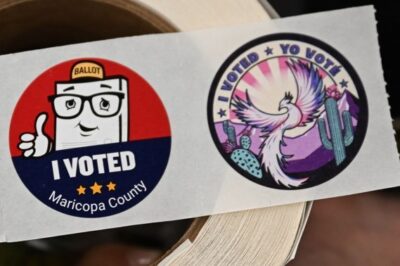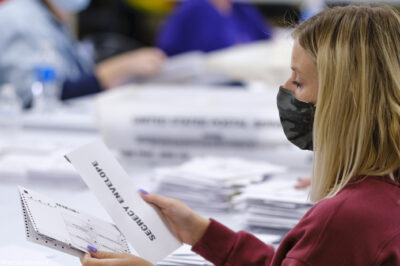The headlines were enough to make a person shudder.
"Influx of Voters Expected to Test New Technology" said The New York Times.
USA Today weighed in with a double-barreled output, "Study: Poor ballot designs still affect U.S. elections" and "Ballot designs are 'literacy test for voters.'"
All three accounts rely essentially on Better Ballots (PDF), a report that the Brennan Center for Justice at New York University School of Law put out this week on how poorly designed ballots continue to undermine elections in the United States.
The study concludes that ballot issues and other problems continue despite Congress setting aside $3 billion to overhaul voting systems across the nation to prevent a repeat of the Florida ballot problems that deadlocked the 2000 presidential race.
The New York Times story is even more ominous: Even as the campaigns and different organizations race to register new voters for November, election officials across the nation are struggling to introduce spanking new technologies and hire staff to work during the election.
All these portend a tsunami of problems and obstacles come Election Day.
How is it that eight years after the Florida fiasco and the impressively problem-plagued voting in Ohio during the 2004 presidential election do we find ourselves, on the eve of another presidential election, in arguably a worse position than we were?
Even as many bemoan the problems with hanging chads and which votes were eventually counted in the 2000 presidential election, more serious violations of civil rights and liberties occurred when Florida officials prevented an unprecedented number of people from voting for various reasons.
A vast majority of this group were African-Americans in urban areas.
Again, in Ohio in 2004, among the myriad problems that plagued those communities were the significant number of voters, especially African-Americans and urban dwellers, who could not vote because of problems with voting machines, too few voting machines, or a myriad of other problems.
It is against that background that the Brennan Center study and the attending news stories do not come as welcome news at all. The problems that beset those two previous election cycles—and every election in between and since—have not been corrected. An argument could even be made that the problems have worsened.
The ACLU's interest in the 2008 elections is what it has always been: free and fair elections and expanding access for voters. We fight for the disenfranchised to have access to the ballot not because of who they eventually vote for, but because it is our historic mission to extend the franchise.
We don't know where or what the flashpoint will be this political season. Our aim should be to ensure that these elections are seen by the entire world to be free and fair; and that no one who is qualified to vote is denied the opportunity to vote.
That is why we will continue to fight for voters as well as monitor the voting on November 4.



